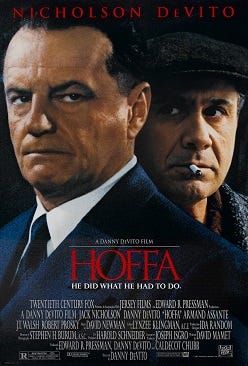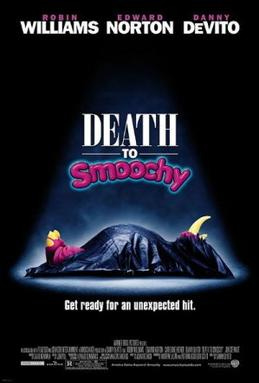C&C 81: Directed by Danny DeVito at CrimeReads
Bonus features for my latest article, with an appropriate cocktail
The Roses opens in theaters this week. Directed by Jay Roach (the Austin Powers films, Meet the Parents) and written by Tony McNamara (The Favourite, Poor Things), it’s the second screen adaptation of Warren Adler’s 1981 novel The War of the Roses and is billed as a “reimagining” of the 1989 film, which used the book’s full title. That movie, an authentically vicious black comedy, is one of six directed by its costar, Danny DeVito. I got to thinking about DeVito’s work behind the camera, which got me to writing. The resulting article is now up at CrimeReads. Consider this a compendium of deleted scenes and outtakes.
Early work. DeVito first made a splash as a director with the short film The Selling of Vince D’Angelo (1982). A fake documentary, it recounts the bid of a crooked Passaic councilman (DeVito) to be elected senator from New Jersey. The short was rediscovered in the wake of the 1992 Presidential race, then again in 2016 when critics noted that the D’Angelo campaign—relying on fear-mongering, race-baiting, and baseless personal attacks, along with the slogan “What The Hell You Got to Lose?”—prefigured the Trump playbook by decades. The short was made for the now-forgotten cable anthology Likely Stories (1981-83), which also served as incubator for the creative team behind This Is Spinal Tap (1984). A website dedicated to Likely Stories has preserved Vince D’Angelo in all its glory.1 DeVito prospered in the early days of what was then called “pay TV,” directing the first made-for-Showtime movie: The Ratings Game (1984), in which he also starred as a bottom-feeding Hollywood producer who concocts a scheme to hack the Nielsen TV ratings system.
Throw Momma from the Train. To be able to show scenes from Strangers on a Train (1951), producer Larry Brezner surrendered sequel and remake rights to Arthur (1981). That’s a heavy burden to place on a film, responsibility for not only the lackluster Arthur 2: On the Rocks (1988) but also the execrable Russell Brand reboot of 2011. Luckily the trade-off is worth it. The scenes in the writing class are still brutal, particularly those featuring Mrs. Hazeltine (jazz singer Annie Ross), who doesn’t do a lick of research for her story set on a submarine but has a way with simile; Mickey Spillane would be proud of “His guts oozed nice, like a melted malted.” I’d stet it myself. The movie was released at the dawn of my surprisingly long career as a movie usher.2 Civilians likely don’t realize that ushers grade films exclusively on their end credits music, which we have to listen to repeatedly as we clean theaters. Throw Momma’s closing song, “Shikisa” by South African artist Sipho Mabuse, remains my favorite track to wield a broom to; I’ll sometimes play it while tidying up at home.
The War of the Roses. In the article, I argue for DeVito’s genius in casting Michael Douglas and Kathleen Turner, their shared screen history adding weight to their scenes as a battling couple. Not only had Douglas and DeVito been roommates decades earlier, but as producer Douglas asked DeVito to reprise his stage role as Martini in the 1975 film adaptation of One Flew Over the Cuckoo’s Nest. All three would continue to work together, Turner and DeVito having recurring roles on Douglas’s TV series The Kominsky Method (2018-2021). The Crimson Eagle, the long-bruited third film in the Romancing the Stone series, never got off the ground. We’ll have to settle for their appearance as backup singers in the video for Billy Ocean’s “When the Going Gets Tough, the Tough Get Going” from The Jewel of the Nile.3
As for who should play the Roses in a remake, assuming a remake is necessary, follow DeVito’s lead while allowing Tony McNamara’s writing credit to point the way. In another few years, pair Emma Stone and Ryan Gosling for the fourth time.
Hoffa. My favorite story from the production comes courtesy of Jon Favreau, an extra in the movie’s big set piece at a labor clash. He played one of the workers but wanted to stick around, so he ran back to wardrobe and said he’d been cast a strikebreaker. Meaning there’s a version of this movie where the future director of Elf and Iron Man beats himself up.
I have no problem with the movie’s positive portrayal of Hoffa—proud product of a union household here—and admire aspects of DeVito’s sincere attempt to forge an American epic on the scale of The Godfather. But David Mamet’s script constantly thwarts those ambitions. Take the scene where Jimmy Hoffa (Jack Nicholson) squares off against Robert F. Kennedy (Kevin Anderson) before the McClellan Committee in 1959.4 It’s a meticulous recreation of an actual hearing, every line taken from testimony and delivered with gusto by both actors—but they’re butting heads about people we haven’t met and never will meet, the issues at stake never explained, the accuracy for naught. Much stronger is a behind-the-scenes clash with Hoffa taking aim at the Kennedy mystique, barking, “Your family don’t impress me. Buncha rumrunners.” Patrick Goldstein, in an August 1992 Los Angeles Times article, accurately branded Mamet’s script “a Hollywood biographical fantasia, a spicy gumbo of fact and fiction,” with DeVito’s character inspired by Chuckie O’Brien, “a Hoffa crony often described as his adopted son” and Armand Assante’s mob boss based on Anthony Provenzano. Mamet the director thought enough of DeVito to cast him in Heist (2001), in which the actor participates in the most noir exchange of dialogue in the twenty-first century and possibly ever.
DeVito: Don’t you want to hear my last words?
Gene Hackman: I just did.
Matilda. Yes, I saw it in the theater even though it was aimed at kids. By this point, DeVito’s name as director was enough to get me to buy a ticket.
Death to Smoochy. And now we come to the real reason I wrote the article: to get people to watch this movie. I’ve found it hysterical for over two decades. I know about its critical reputation, and I don’t care. I laugh at this movie every time I see it, and I’ve seen it a lot. I quote from it routinely, usually Robin Williams’ more off-color lines. I’m also partial to one uttered by DeVito’s no-nonsense talent agent: “Allow me to untangle this web of shit.” The Jersey accent helps enormously.
Duplex. The only film DeVito directed that I dislike. The script by veteran Simpsons scribe Larry Doyle does feature several choice bits about writers, like Ben Stiller’s character grousing about not wanting to write at Starbucks with all the other novelists. Justin Theroux plays his crime writer pal, far more successful commercially but self-conscious about the quality of his prose. But I never need to see the “That was the only copy of my manuscript!” gag again. What professional writer doesn’t back up their work, for fuck’s sake?
Unrealized Projects. DeVito was attached to a number of proposed remakes. He was tapped to direct Tom Cruise in an update of I Married a Witch (1942).5 He was going to direct and star in The Man Who Came to Dinner (1942), and anyone who doubts that DeVito could play Sheridan Whiteside as written hasn’t seen him in Other People’s Money (1991), where he gets to deliver the buggy whip speech. I wish he’d followed through on plans to remake the French film La Chienne (1931), which already served as the basis of Scarlet Street (1945). The notion of DeVito playing Edward G. Robinson’s role from Scarlet tantalizes. For some reason the prospect called to mind DeVito’s turn in The Big Kahuna (1999), particularly his closing monologue.
Legacy. Last month, when protestors in New York City were throwing around ideas for Italians who might be honored in place of Christopher Columbus, a Danny DeVito chant broke out. I’ve heard worse suggestions. It seems unlikely, so let’s consider more reasonable options. I’m launching a campaign for either an AFI Lifetime Achievement Award or an honorary Oscar in light of what he’s accomplished as an actor, producer, director, and, in his words to the Daily News in 1987, “five-foot-tall Italian guy from New Jersey.”
One more time, check out the article at CrimeReads.
What I’m Drinking
Time to mix a cocktail in honor of the man of the hour. Danny DeVito is proud of his New Jersey roots—he’s the pitchman for Jersey Mike’s subs and is in a “grandpa group chat” with longtime friend Bruce Springsteen—so here’s one with a Garden State genealogy.6 The Newark is part of the extended Brooklyn family of drinks, this one created by Jim Meehan and John Deragon when they were at New York’s PDT. It swaps in Fernet Branca for the Brooklyn’s Amer Picon, but the key innovation is the use of Laird’s apple brandy from Monmouth County, NJ. It’s the perfect beverage for autumn, which will be here soon enough.
The Newark, by Jim Meehan and John Deragon
2 oz. Laird’s bonded straight apple brandy
1 oz. sweet vermouth
¼ oz. Fernet Branca
¼ oz. maraschino liqueur
Stir. Strain. No garnish.
Another Likely Stories curio: Christopher Guest’s directorial debut Dead Ringer, an elaborate film noir parody in which Guest plays every role. It’s technically accomplished but the jokes don’t land and Guest isn’t cut out to do voiceover. Still, everybody’s gotta start somewhere.
In my heart, I am convinced that I was better at that job than at any other I’ve held.
God, I miss this period of pop culture.
Not that the movie tells you when any scene takes place, which is one of its greatest failings.
The original featured costumes by Edith Head, so you know what that means: mandatory Renee Patrick plug.
DeVito sold his own brand of limoncello for over a decade, but it’s no longer available.





Coming very late to this, but I just visited Oberlin with my kid and found out that when Danny DeVito’s son went there, DeVito donated a bunch of money to save the local movie theater AND fund a school of cinema studies. That’s commitment to film.
I love Throw Momma so much. I can’t hear the word “sultry” without thinking of that movie.